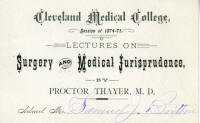Proctor Thayer, M.D.
Dr. Proctor Thayer, physician and surgeon, born in Williamstown, Berkshire County, Massachusetts, October 16, 1823. When seven years old he lost his father, Daniel Thayer, a farmer, and when of sufficient age was sent to Western Reserve College, Hudson, Ohio, where he graduated, at the age of nineteen, in the scientific department. On leaving college he taught school with the Rev. Samuel Bissell, of Twinsburg, until he decided to study medicine, for which purpose he entered the office of Dr. John Delamater, in Cleveland.
He graduated at the Cleveland Medical College in 1849, and was associated in the practice of his profession with Dr. Delamater for the next ten years. In 1852 he was appointed demonstrator of anatomy at the Cleveland College, and in 1856 was chosen to fill the chair of anatomy and physiology, holding this position until 1862, when he took the chair of the principles and practice of surgery, with the addition of jurisprudence. During all this time he had a large medical and surgical practice. Believing that a thorough mastery of his profession necessitated a well grounded knowledge of the principles of all other branches of scientific knowledge, and an acquaintance with the newest discoveries and processes, he was an assiduous student in mineralogy, geology, chemistry, philosophy, and mathematics, being peculiarly gifted in the latter. The knowledge thus gathered enriched his college lectures and enlarged the minds of the students.
In college management he was an innovator of radical stamp. The system of reading his lectures was never adopted by him, and even the use of notes was abandoned. In eighteen hundred lectures delivered, not one was given with written notes, the object being to give information in the most direct and forcible manner, and to include the very latest facts. As he was a fluent lecturer, with a fine command of language and a complete mastery of his subject, the lectures were always interesting and instructive, and their success led to the adoption of similar plans by other professors. Another innovation was that of lecturing on practical anatomy five months instead of five weeks, he holding that practical anatomy was the basis of the profession. As a surgeon he was widely known to be a skillful and safe operator, and performed many of the most important operations with brilliant success. His reputation as a fine clinical lecturer and demonstrator was well established. Outside his profession he was a good citizen, who took an active interest in the public welfare, and was known to be a man of strong convictions and of incorruptible honesty. He served in the City Council for four years.
When the civil war broke out, he tendered his services, without compensation, to examine the soldiers who entered the Union ranks, and several thousand were so examined by him. No man was more enthusiastic and patriotic than he, his time and money being freely given to the cause of the country.
Later in the war he entered the United States Army, serving at the reduction of Forts Sumter, Moultrie, and Wagner, after which he was given charge of the principal hospital for the wounded at Beaufort, South Carolina. He was honorably relieved from further service, and returned to the practice of his profession in Cleveland. He died October 1, 1890.
________________
Dr. Proctor Thayer, a prominent physician of Cleveland, 0hio., died in that city on October 1st. Dr. Thayer was born in Wil- liamstown, Mass., on October 16, 1823, but has lived in Ohio since his eighth year. He graduated from the Cleveland Medical College in 1849. In 1852 he became demonstrator of anatomy, and four years later professor of anatomy and physiology in the Western Reserve Medical College.
When the war broke out he entered the army as a surgeon, and served at the reduction of Forts Suinter, Moultrie and Wagner, and was afterwards placed in charge of a large hospital at Beaufort, S. C. Dr. Thayer was in the battles of Pittsburg Landing and Corinth, and from the latter he brought three hundred wounded men, distributing them on the way to Cincinnati. He was honorably relieved from further service, and returned to Cleveland. He resumed his connection with the Western Reserve Medical College, and added much to the growth and progress of that institution. Of late years he was professor of surgery and of medical jurisprudence, hut he resigned last winter, because of failing health. His resignation was accepted only so far as concerned the chair of surgery, and he consented to retain his professorship of medical jurisprudence. He was then made emeritus professor of surgery.
Dr. Thayer had been in ill health for several years, but until last March he did not retire from active practice.
